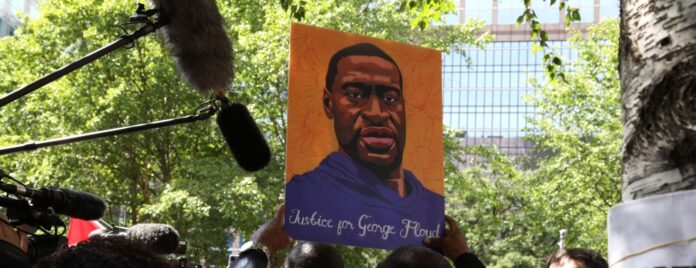The New York Police Department will need to develop new policies on confronting large protests, with a focus on de-escalation, under a settlement approved over the protest of the police union.
The plaintiffs allege the department used excessive force during demonstrations ignited by the murder of George Floyd in 2020, including beating protesters and spraying them with tear gas and pepper spray. Protests sprung up across the country after Floyd was killed by a Minneapolis police officer, with millions participating in marches and rallies. The demonstrations were sometimes met with force, and lawsuits were filed around the country in response, including these suits.
The settlement mandates the creation of new policies and procedures focused on de-escalation and the adoption of a tiered reaction system when police encounter what the agreement calls First Amendment Activities—public gatherings and expressions of free speech. The settlement provides for written reports after enforcement actions, a “collaborative oversight committee” to review police responses, and revised training and measures to improve how police approach members of the public and the press in connection to the activities.
Judge Colleen McMahon rejected the arguments of the Police Benevolent Association of the City of New York Inc., the collective bargaining unit that represents police officers below the grade of detective, against the tiered system. The union said the tiered system “unduly restricts” enforcement discretion during the activities and isn’t fair or reasonable because police personnel hadn’t exhibited a “pattern and practice of constitutional violations.”
“[I]t is entirely counter-intuitive for the PBA to demand (as it effectively does) that this case be tried before it can be settled — especially as there is no guarantee that a New York City jury would absolve the PBA’s members of the alleged legal and constitutional violations,” McMahon said in an opinion for the US District Court for the Southern District of New York. “It would be improper for the court to demand that the parties make any showing on the merits of the claims being settled,” she said.
The tiering provision also “leaves ample room for officers to make judgment calls in real time,” McMahon said.
The settlement was reached by both parties outside of court after they decided it wasn’t in their best interest to have the lawsuit go to trial, according to the judge.
The reforms were part of an agreement reached after the Legal Aid Society, the New York branch of the American Civil Liberties Union, and New York Attorney General Letitia James sued the city for excessive force and First Amendment violations
“The next time a peaceful protest is hijacked by rioters, the next time our roads, bridges or subways are shut down by agitators, New Yorkers should remember that their city chose to encourage these disruptions by signing onto this misguided settlement,” the BPA said in an online statement in response to the approved settlement. “If the NYPD is unable to prevent future demonstrations from devolving into chaos, the parties who signed onto this settlement must bear the blame.”
Counsel for the plaintiffs spoke favorably of the settlement, also in online statements.
“We’re gratified that the Court saw the PBA’s opposition for what it was: a baseless hail Mary that would perpetuate the abuses we saw in 2020,” according to a statement issued by Deputy Legal Director at the New York Civil Liberties Union Molly Biklen and The Legal Aid Society’s Criminal Law Reform Unit’s Staff Attorney Jennvine Wong. “Now, in partnership with the Attorney General and our plaintiffs, we can realize the promise of this settlement, which will overhaul the way the NYPD polices protest.”
New York Civil Liberties Union, Legal Aid Society, and others represented the plaintiffs. The New York City Law Department represented Former New York City Mayor Bill de Blasio (D) and the city.
Schlam Stone & Dolan LLP and Robert Sherlock Smith in New York City represented the PBA.
The case is In re New York City Policing During Summer 2020 Demonstrations, S.D.N.Y., No. 20-cv-08924, 2/7/24.
